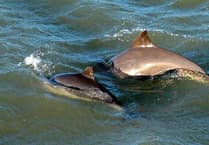Every year National Trust Cymru close the Blue Lagoon in Pembrokeshire to the public to protect breeding seals from disturbance, however due to some early arrivals, the conservation charity have closed the lagoon a week earlier than planned.
There’s been an increasing numbers of the Grey seal population breeding in and around the lagoon over recent years. This combined with the Blue Lagoon’s high visitor numbers and its sheltered nature, which makes it so attractive to seals, creates a situation where there is a high potential for disturbance to seals.

As a result, the former slate quarry at Abereiddi closed on Saturday, September 16, and will reopen on November 4, subject to breeding activity.
Mark Underhill, National Trust Cymru’s Countryside Manager, Pembrokeshire said:“There are two species of seal that can be found in Britain; the Common seal and the Grey seal. Only Grey seals occur regularly in Pembrokeshire, where they are present all year around.
“About half the world’s population of Grey Seal breed on our coastline and the total number in West Wales, mostly Pembrokeshire, is estimated to be about 5,000, with some 1,400 pups being born each year.
“The breeding season is vital for our seal colonies here in Pembrokeshire, and we ask that visitors do not access the Blue Lagoon and that they follow the guidelines laid out by the Seal Alliance and Pembrokeshire Marine Code when on the coastal path.”

The time seals spend resting on land is vital to their health and that of their pups as they are digesting a recent meal, socialising and feeding their young. In order to provide them with a safe environment to raise their pups, National Trust Cymru will closed the Blue Lagoon to visitors from September 16 through to November 4. Re-opening is subject to seal breeding activity at that time.
Visitors will still be able to watch these wild creatures in their habitat from the Wales Coast Path and coasteering activity providers who have signed up to the National Trust’s Coasteering Agreement and undertaken specific training on how to operate around seals, will still have access to the lagoon with groups of visitors who have booked in advance.
To avoid disturbing seals at this very important time of year, National Trust Cymru recommends following the Pembrokeshire Marine Code: Stay quiet, keep your distance and at least 50m away from seals and never come between a seal and her pup, or a seal and the sea and don’t take dogs near a seal breeding area.
The Trust also asks that if a seal is spotted in distress or alone never approach the pup. Seals are often left alone on the beach and distress can be caused by contact with people.
Sadly, also at this time of year some seal pups don’t survive. Whilst it’s distressing to find a dead seal pup, there are a number of natural causes that can cause them to lose their lives.
To raise any concerns about seals or seal pups contact conservation group Welsh Marine Life Rescue on 01646 692943 or 07970 285086 who will be able to offer you further guidance.





Comments
This article has no comments yet. Be the first to leave a comment.